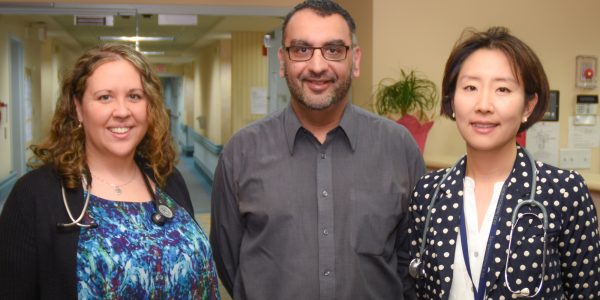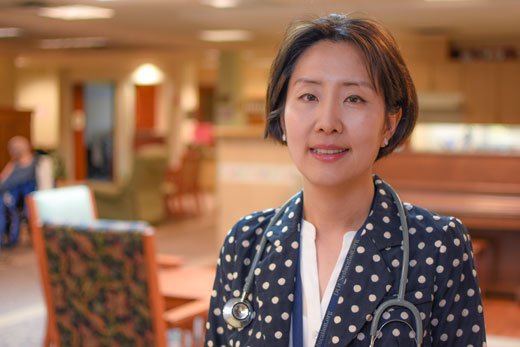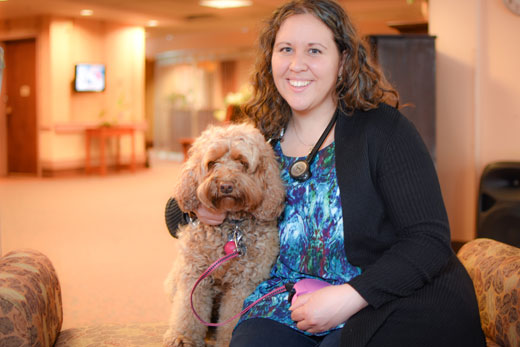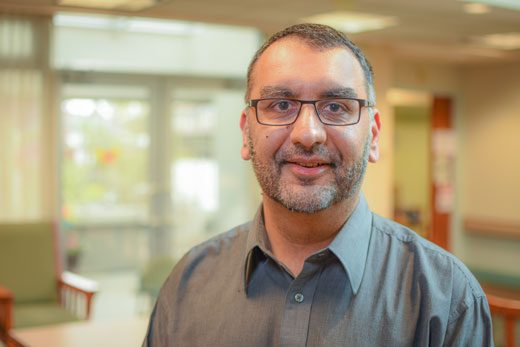“I couldn’t have chosen a better profession”
They come from diverse backgrounds but these nurse practitioners (NPs) share a commitment to providing the best of care to seniors nearing their end of life.
Meet Stephanie Hong, Nadeem Rahemtulla, and Amanda Crockett.
Working in Vancouver residential care homes, they find caring for residents both rewarding and life-affirming. And, while any one of them could have said it, Nadeem voices their shared sentiment: “I couldn’t have chosen a better profession.”
Stephanie: paving the way
Stephanie is the trio’s veteran; she has worked in various residential care settings for 10 years. She currently splits her time between Banfield Pavilion and Lakeview Care Centre.
“When I started, I wasn’t given a caseload; I was simply helping out the physicians,” recalls Stephanie. “My colleagues — physicians, nurses and management — didn’t understand my role and I had to work hard to develop it. Now I have a caseload of about 80 residents and I provide them with comprehensive primary care as the most responsible clinician onsite.”
Stephanie was more easily accepted, she says, by the residents and their families, who were always grateful for the extra care and attention the NP role allows for.
“I have a special connection with the people I treat,” she says. “I see them until they die and also have long-term relationships with their families. It’s rewarding work and I know the families appreciate having an engaged clinician who addresses their concerns.”
Amanda: respecting residents’ wishes
Amanda, who has been working as an NP at Little Mountain Place, Fair Haven and the German Canadian Care Home since October 2014, emphasizes the vital role goals of care conversations play in her practice.
“These conversations with residents and family members are really helpful,” she says. “We talk about the resident’s wishes and how to handle situations before they come up. These can be really hard discussions. But if a person has multiple chronic illnesses, you really have to consider whether it is appropriate to intervene and move them to ICU — are you really alleviating their suffering or causing more harm? This level of engagement with families is unique to the NP role and I see it as a way to educate and empower.”
Amanda echoes her NP colleagues when she remarks, “There is a beauty to being present with people who are often so alone and marginalized at the end of their lives. There is so much to be gained by working with them and being their bright, shining light. It’s a real gift.”
Nadeem: enhancing palliative care
It’s not unusual for NPs to provide their expertise on special projects. Nadeem, who works at Dogwood Lodge, Haro Park Centre, Braddan Private Hospital and Central City Lodge, was a key player in a palliative care project undertaken at Haro Park Centre.
“Our residents are fragile and many have dementia,” he says. “The project’s purpose was to determine inappropriate degrees of intervention. For example, transferring a resident to acute care may not be the best option. Sometimes, it’s more important to make sure they are comfortable.”
The palliative care project educated residential care nurses on frailty and dementia scales and Haro Park Centre and has consequently reduced the number of residents inappropriately transferred to hospital.
Learn more about Vancouver nurse practitioners
- VIDEO: 5 myths about NPs you probably believe
- VIDEO: What is the role of a nurse practitioner?
- Because physicians can’t do it alone: Meet NP Bonnie Giovannetti, VGH Neurosurgery Unit
- Barb sees gaps in care when others can’t: Meet NP Barb Eddy, Downtown Community Health Centre
- “Our clinic relies on Lisa”: Meet NP Lisa Lee, VGH Pulmonary Hypertension Clinic
- Nurse practitioner trio takes to the streets: Meet the NPs of Primary Outreach Services in the Downtown Eastside
- “She’s like a daughter to me”: Meet NP Jo Birdsall, Three Bridges Community Health Centre




